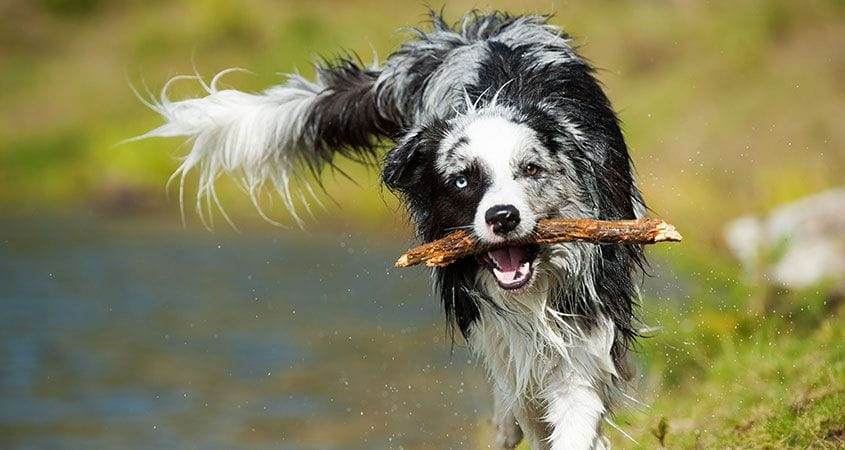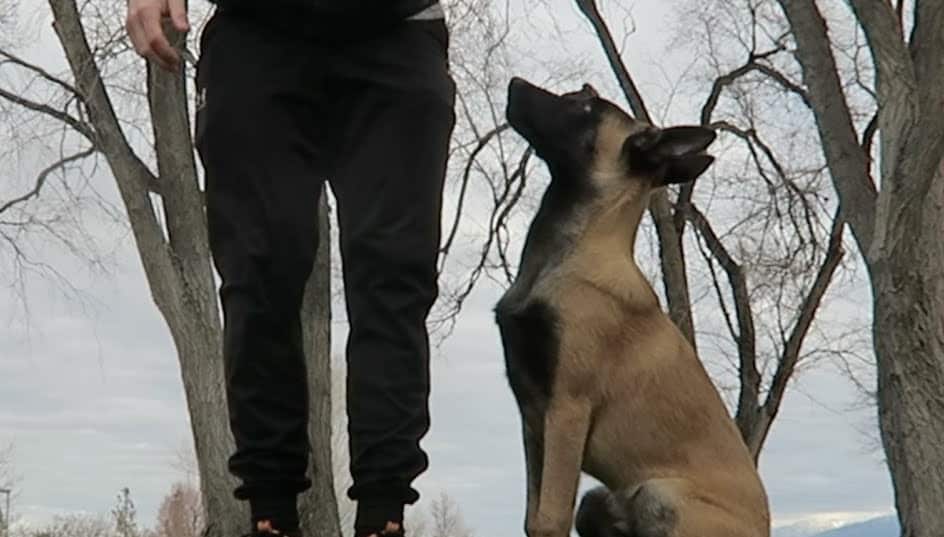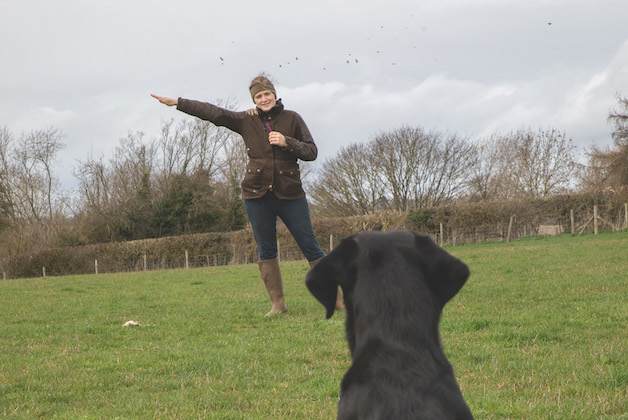If you are a novice retriever owner and want to bond with your puppy, a fetch game can do wonders for you. It is a game that is loved by most dogs. And the best part is you can play it anytime and anywhere.
Besides enjoyment, playing fetch can be a good source of exercise for your dog. As the game requires your dog to engage all its natural faculties, your objective to engage your dog’s mind and the body becomes successful. As a result, you have an obedient, well-behaved, and healthy dog.
Now that you have discerned all the benefits of playing fetch, you must be wondering how to teach your dog this game.
Well, if you have got your retriever from a reliable breeder who has given special attention to its aptitude, then congratulations. You have a natural retriever. However, that doesn’t mean you don’t have to work on your dog’s retrieving skills.
What we meant by a natural retriever is that your dog has the required retrieving instinct. But it is you who has to awaken that instinct and make your dog know its ability.
If you are confused about how to do that. Then don’t be. That’s what we are here for. Read ahead, and you will get all your answers.
Make Your Dog Realise That It Loves Retrieving
Some retriever owners become so serious about developing their dog’s retrieving skills that they make retrieving a routine task for their dogs. Consequently, they become frustrated when their dogs fail to meet their expectations.
It is okay if you want your dog to win all field trials and become the champions’ champion. However, you must not forget that your dog cannot excel in a task if it does not love doing it. Therefore, if you want your dog to be the best in the field, you have to make it realize that it loves retrieving.
Once your dog becomes crazy for retrieving, it will start seeing the retrieve as its reward for its hard work. Consequently, you won’t have to work much on sharpening its retrieving skills. All you will have to do is showing it the correct way to do the task at hand.
Use Your Voice to Make Your Dog See Retrieving As Having Fun
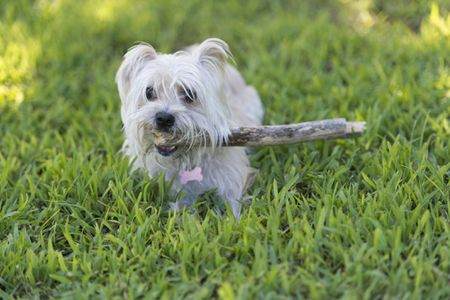
If you have adopted your retriever puppy from a recognized kennel, you won’t have to do much to awaken your dog’s retriever instincts. However, you will unquestionably have to put some hard work on enhancing those instincts.
To begin with, you will have to make your puppy understand how fun retrieving is. Once your pup realizes this fact, half of your work is done. After that, you can use the retrieving as a reward to correct your dog’s stance and behavior during the training sessions.
Now the question is how to make your dog realize that retrieving is fun. The answer is your voice. You need to use your voice inflections to make your puppy understand that fetching is about enjoyment.
You must have observed that we tend to change our voice tone while talking to babies. It is because we know that they do not understand our language. Therefore, we use different voices to convey our message to them. The same is the case for dogs.
When you intend to teach your dog “Fetch” and throw something to retrieve, use your happy voice. Make your puppy understand that it is a leisure time activity, and both you and your pup enjoy this game of fetch.
Two Bad Habits You Must Not Allow Your Dog to Develop
People are confused about when and how to start training their small puppy. However, most of them don’t realize that they have begun their pup’s training the minute they have adopted it. Just like children, your dog’s behavior depends on your upbringing. They observe your actions and respond to you accordingly.
If you go by some expert trainers’ opinions, you will understand that your dog’s problematic behavior is not in actuality its own problem. It is your problem reflecting on your dog’s behavior. So, if you want an obedient and well-behaved dog, you need to start monitoring your and your family’s behavior towards your dog from the puppy stage itself.
There are some specific habits that you have to make sure that your dog doesn’t develop from the puppy stage itself. If you uproot those habits from the roots itself, you can avoid the troubles of correcting those practices at the later stage of your dog’s life.
- Keep Away
Retrieving is not merely about getting the fallen bird. It entails the application of a variety of skills. One of the most prominent of those skills is control. However, this skill is not in-built in your dog. On the contrary, your dog is wired to act on its impulses. Therefore, it is you who has to instill this particular skill in your dog. For that, you need to make your pup work with a leash on its neck.
Initially, your puppy will find it challenging to run with a leash. It can even trip or stumble. However, eventually, it will have to learn that it cannot transgress certain boundaries without your permission. Not because it is you who the leader is but because it needs to remain safe. Only limitations can make your pup succeed and stay safe.
Therefore, use a lead whenever you teach your dog to fetch. If you see that your dog is a good chaser but a hesitant retriever, slightly pull on the leash and use your pleasant voice to make it return the ball or bumper.
As your pup becomes more accustomed to working with a leash, you won’t find it much difficult to advance your dog’s retrieving skills when it grows up. Besides that, you will have a well-behaved and obedient dog ready to take on the world. - Tug of War
Working with a leash will definitely not serve unless you teach your dog that it is not supposed to play tug of war with you. Imagine yourself pulling your dog’s leash to make it return the bumper or ball, and it doesn’t budge.
If you don’t want such a scenario in your real life, you have to start working on your dog from day one itself.
When you start teaching your puppy to fetch, and it doesn’t return the object, do not try to snatch it from its mouth. There is no doubt that you will successfully grab the article from your pup’s mouth despite its persistence. However, this tug of war between you and your pup will turn into a habit. Just think about doing this stunt with a big dog of 80 pounds. Obviously, not possible.
Therefore, instead of snatching the object from your dog, hold your puppy’s mouth from its nose. Consequently, its lips will be pinched by its teeth. Following which you need to command it to “LEAVE IT” or “RELEASE.” Ascertain that you don’t put too much pressure on your pup’s mouth. Otherwise, it will get hurt.
Once your pup opens its mouth, take out the object, and leave its mouth. After that, reward your puppy with praise and affection.
5+ Things You Must Avoid While Teaching Your Dog “Fetch.”
By now, you must have understood that preventing your dog from developing the habits mentioned above is a matter of teaching your dog the correct way of doing things from the puppy stage itself.
As far as playing fetch is concerned, you don’t need to do much hard work to teach your dog how to retrieve a ball or bumper. This skill is, in fact, hard-wired into your dog’s system. However, you need to teach your puppy the correct way of doing it. For that, you need to be aware of the things you must not do while teaching your dog to fetch.
- Pouncing on your Dog.
Generally, people become so excited seeing their small puppy returning with the retrieve that they forget all rules and pounce on their pup. They do it not merely because of happiness.
Sometimes, your pup may show no signs of slowing down. Consequently, you may get worried and jump towards it to stop it. However, you must refrain from taking such a step. Your pup may think that you are having fun and start playing tug of war or keep away. - Taking the ball or bumper right away.
When your puppy returns with the ball or bumper, do not try to snatch it from its mouth. It will not want to give you its hard-earned retrieve, and you two will end up playing tug of war. Instead, reach for your dog. Allow it to enjoy its reward for some time. - Not showing enough appreciation.
If you don’t praise your puppy, how will it know that it has done an excellent job? Providing your pup with lots of affection and praises for its hard work won’t spoil it. Instead, it will boost your pup’s confidence, and your dog will come to know what it is supposed to do to get your affection. - Not kneeling down to your puppy’s level.
Have you ever heard the story of “Jack and the Giant-Man.” Well, you exactly look like that giant standing in front of your 12 weeks old or even smaller puppy. Why will it return to such an intimidating personality? So, have some mercy on your little dog and kneel down to reach its level as it returns to you with the retrieve. A pleasant voice and encouraging words can make the scene more inviting for your pup. - Making the Training Sessions too long.
Your goal is to make retrieving fun for your dog and not bore it to death. Generally, a puppy tends to have a significantly less attention span. If you make the training sessions too long, you will ultimately kill your pup’s retrieving drive. So, try to shorten the duration of the training sessions. An ideal training session for a puppy will be of only five to ten minutes. Do not extend it beyond that even if your pup is willing. - Expecting your puppy to retrieve distant throws.
You cannot expect your small puppy to retrieve distant throws like a master retriever. It has short legs which are prone to get tired after running such long distances. You surely don’t want your pup to associate retrieving with exhaustion. So, make the throws small. Ascertain that the bumper or ball doesn’t fall beyond 6 feet from your puppy. You can make the process more straightforward for your dog by playing the game in a spacious closed room. - Showing disappointment or anger
One of the most essential rules you must follow while training your puppy is being in control. You need to control everything- your pup, the situation, and most significantly, yourself. As far as your pup’s behavior is concerned, you need to be patient at all times. If you show your disappointment or anger while training your dog, it will start relating the retrieval task with your rage. Consequently, its drive for retrieving will diminish.
What should You Use to Play “Fetch” With Your Puppy?
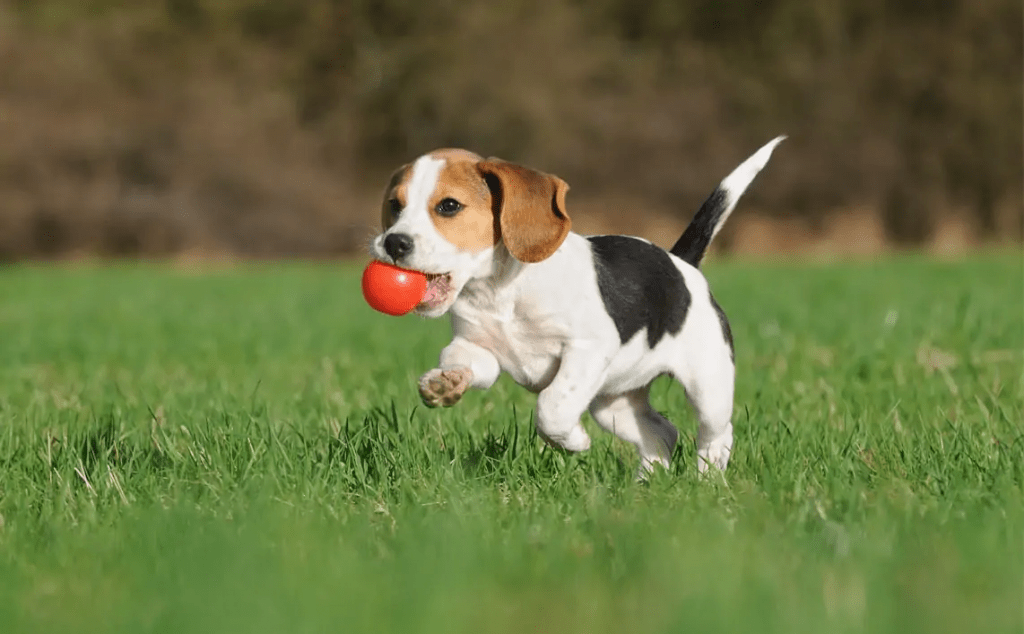
When it comes to teaching your dog “Fetch,” you can throw almost anything to make your dog retrieve. To begin with, you can use small tennis balls. Not only are they fun and quite hard to chase but also suitable for your dog’s mouth. Its soft outer cover makes it comfortable for your dog to hold it with its mouth.
Besides that, you can use rope-chew toys, balled-up socks, ordinary sticks, and small bumpers. In fact, making your pup fetch different kinds of things makes it more open to variation.
Some dogs may be excited to retrieve a particular species of bird while refusing to fetch others. To think about it more deeply, there can be various reasons behind such refusal. The dogs may not have liked the taste or smell of that particular bird species or may have been trained to retrieve only some selected species.
It is not mandatory to teach your puppy to retrieve all the existing birds in this world. However, if you teach your pup to fetch various kinds of things, it will realize that it is supposed to retrieve everything that falls from the upward direction. And that is precisely what you need to expect from your dog.
Introducing Dog to Fetch Feathers
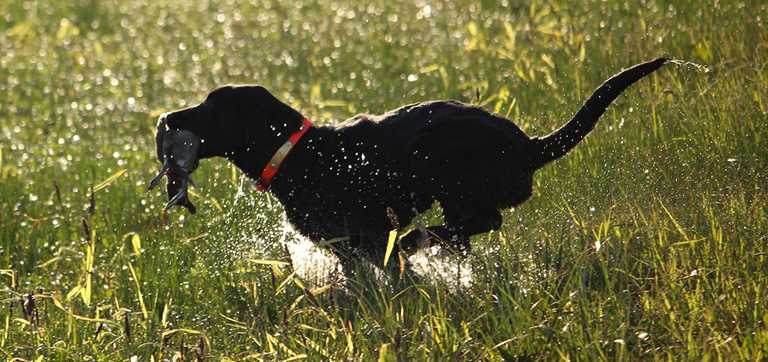
Besides making your dog open to variations in retrieve, you must try to introduce them to feathers without any delay. According to Tom Dokken, one of America’s leading trainers, exposing your puppy to feathers triggers their instincts to chase and search birds.
Imagine how weird it will be if your retriever, which spends hours chasing your little tennis ball, won’t touch a feather when asked to retrieve a bird in the field. If you don’t want such imagination to become a reality, then start your dog’s initiation to birds at the puppy stage itself.
You can begin this whole training process by introducing your pup to a bird’s wing. You can use any bird’s wing, such as a pheasant or a pigeon. If you don’t find one in your surroundings, you can order one from Amazon or Cabela’s.
Once you have got your wing, throw it a few meters away from your puppy. If your dog runs towards the wing and retrieves it, well and good. You won’t have to work much.
If it hesitates to touch the wing, don’t be upset. It will take time, but your pup will be okay. Carefully observe your pup’s actions. If it pokes, sniffs, or jabs the wing, that’s a good sign. It means your puppy is curious about the pinion.
To further trigger your pup’s curiosity, throw the wing once again. Use your pleasant voice to encourage it to retrieve the pinion as you have done for other items. Once your dog is victorious, do not forget to reward it with lots of praise.
As you see your pup leaving all its apprehensions regarding the wing and getting enthusiastic about retrieving it, time to move to the next stage of this process.
Fasten a string with a pole and attach the wing at the end of the rope. Now, hold the bar and make your pup run after the bird’s wing all-around your house. It will further enhance your dog’s desire to catch the bird’s wing. Gradually reduce your pace to allow your dog to grab it. With every successful chase, your pup will become more excited about the bird’s wing.
Ascertain that you make your pup wear a “puppy check cord” during this whole chasing process. Otherwise, your dog will try to jump and chew the wing. You definitely don’t want that because it will turn into a bad habit. It is all about doing it the right way, remember?
After a few months, as your pup becomes more accustomed to the wing, you can introduce it to a real bird.
Conclusion
Your dog’s retrieving ability will primarily depend on the breeder from whom you have adopted it. If your pup’s breeder has focused only on its overall appearance, you may have to work a lot on your dog’s retrieving skills. However, if your breeder has given special attention to your dog’s aptitude, your pup will be almost configured to fetch.
However, you must remember that your dog’s prowess in retrieving will depend on your training. Your dog may be, by nature, a retriever. But it doesn’t know the right way to get done with the task. It is you who will teach your dog the right way by preventing it from developing any bad habit and correcting it when it does something wrong.
Table of Contents
